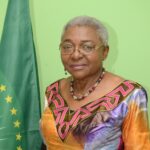The African Commission on Human and Peoples’ Rights (ACHPR)on May 3, 2021 joined the international community in commemorating this year’s World Press Freedom Day, and used the occasion to reflect on the experiences of journalists and other media practitioners in Africa.
In a statement issued through the Special Rapporteur on Freedom of Expression and Access to Information in Africa, Commissioner Jamesina Essie L. King, the Commission, reflecting on the experiences of journalists and other media practitioners in Africa noted that although the state of media freedom has greatly improved on the continent since the 1991 Windhoek Declaration, nevertheless,it was important to stress that journalists should not be imprisoned for exercising their right to freedom of expression and practising their profession.
The Commission recalled that the World Press Freedom Day has its origins in a seminar convened by the United Nations Educational, Scientific and Cultural Organization (UNESCO) in Windhoek, Namibia in May 1991. It was at this conference, it noted, that African journalists adopted the Windhoek Declaration for the Development of a Free, Independent and Pluralistic Press (the Windhoek Declaration). This Declaration, according to the statement, underscored, inter alia, that “the establishment, maintenance and fostering of an independent, pluralistic and free press is essential to the development and maintenance of democracy in a nation, and for economic development.”
The statement also noted that in December 1993, the United Nations General Assembly proclaimed May 3 as World Press Freedom day adding: “The commemorations embody the proposal made during the Windhoek seminar to raise awareness on press freedom and remind Governments of their duty to respect and uphold the right to freedom of expression.”
Saying the commemoration of this important date in 2021 coincides with the 30th anniversary of the adoption of the Windhoek Declaration, the Commission noted that the occasion also provides Africa with an opportunity to reflect on the situation of the right to freedom of expression on the continent.
It stated that while substantial gains have been made in the field of media freedom in Africa in the past 30 years, including the marked increase in privately owned media, the repeal of criminal defamation and insult laws, adoption of access to information legislation, among others, much remains to be done.
Reflecting on the experiences of journalists and other media practitioners in Africa, the Commission said the state of media freedom has greatly improved on the continent but noted however, that cases of murder, enforced disappearance, arrest, harassment, intimidation and other human rights violations have persisted, often with impunity.
Citing the cases of KilweAdan Farah, a freelance journalist in Somalia who was arrested and detained after he covered an anti-inflation protest in Garowe town, Puntland and Hopewell Chin’ono, a journalist working in Zimbabwe, arrested in early 2021 for the third time in six months, on allegations of publishing or communicating falsehoods prejudicial to the State, the Commission pointed out that on the occasion of the 2021 World Press Freedom day, it is important to stress that journalists should not be imprisoned for exercising their right to freedom of expression and practising their profession.
Commending the release by Egyptian authorities of Al Jazeera journalist Mahmoud Hussein on February 6, 2021, after more than four years in pre-trial detention on accusations of publishing false news, the Commission stated that it is important to note that pre-trial detention is a measure of last resort, should only be used where necessary and where no other alternatives are available, and lastly should strictly follow the legally prescribed duration for such detention.
The Special Rapporteur also deplored the cases of missing journalists, including Jean Bigirimana, a journalist working in Burundi, who has not been seen since July 2016, following his arrest reportedly by National Intelligence Service (SNR) agents, and AzoryGwanda, the newspaper journalist working in Tanzania, who has been missing since November 2017.
The Special Rapporteur reiterated the provisions in Resolution on the Safety of Journalists and Media Practitioners in Africa citing ACHPR/Res.468 (LXVII) 2020, which called on States Parties, inter alia, to “ensure the safety of journalists and other media professionals, and create a conducive environment for them to practice their profession,” and to “investigate, prosecute and punish perpetrators of attacks against journalists and other media practitioners.”
Accordingly, as part of commemorations for World Press Freedom day, the Special Rapporteur called on States Parties to fully investigate all cases of missing or disappeared journalists.
The Special Rapporteur also recalled regrettable cases of physical assault of journalists, which sometimes result in death and cited an incident in Uganda where several journalists were assaulted and injured while reporting on a story at the UN Office in Kampala and the case of Betty MutekheleBarasa, a senior video editor and television producer working for the Kenya Broadcasting Corporation who was shot and killed in her home by unidentified gunmen on April 7.
Commissioner Jamesina King called on all to “… use this day to condemn in the strongest terms, all acts of violence committed against journalists and other media practitioners, and urge Government authorities to fully investigate all cases of attacks against journalists.”
“To this end, it is important to recall that the revised Declaration of Principles on Freedom of Expression and Access to Information in Africa, adopted by the Commission in November 2019, reaffirms the key role of the media and other means of communication in ensuring full respect for the right to freedom of expression, promoting the free flow of information and ideas, assisting individuals in making informed decisions and facilitating and strengthening democracy,” she said.
World Press Freedom Day acts as a solemn reminder and a call to Governments in Africa of the need to respect and fulfill their commitment to press freedom at all times and in every situation. Whilst we have made some strides on the advancement of freedom of expression enshrined in Article 9 of the African Charter on Human and Peoples’ Rights, we still have a long way to go in order to make this right a reality.







